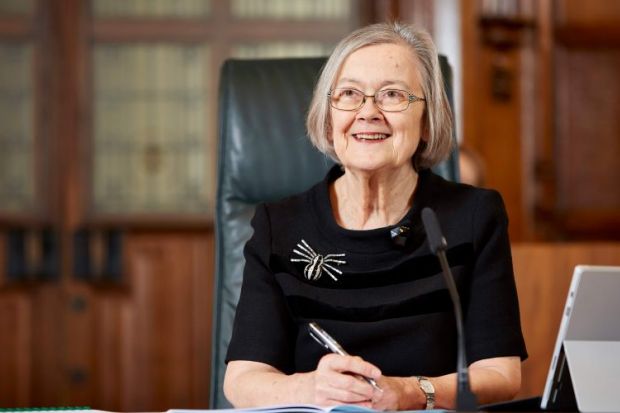Interview with Baroness Hale

Baroness Hale of Richmond retired as president of the UK Supreme Court in January. After graduating from the University of Cambridge, she taught law at the University of Manchester for 18 years. She was the first woman appointed to the Law Commission, the first female Law Lord and the first female Justice of the Supreme Court. Lady Hale attracted widespread media attention in September 2019 when she delivered the Supreme Court’s ruling that Boris Johnson’s decision to suspend Parliament for five weeks was unlawful. She was recently appointed honorary professor in the UCL Faculty of Laws.
When and where were you born?
I was born in Leeds on 31 January 1945. My parents were then living in Redcar, but my mother had gone back to the doctor and the nursing home she trusted, having had a difficult time when my elder sister was born eight years earlier. They moved to Scorton, a village near Richmond in the North Riding of Yorkshire (as it was then), when I was three, so that’s where I grew up and went to school.
How has this shaped you?
We Yorkshire people are very proud of our heritage, wherever we come from in that huge county. But Richmond and its surroundings are particularly beautiful, both the landscape and the ancient buildings, so I grew up with a sense of wonder at the beauty of the world, together with some understanding of rural life and society.
What kind of student were you in your undergraduate days?
I have always been a speccy swot, but my recollection is that I worked even harder for my A and S levels than I did for my degree. I certainly took full advantage of all that Cambridge had to offer – including acting, singing and the Yorkshire Society.
Did your background in academic law provide beneficial foundations for your subsequent career? Why might there be a perception among some in law that academia is somehow a lesser route?
No doubt there are some who look down on academic law because, unlike some disciplines, there is the alternative of practice, which tends to be much better paid and can lead on to high judicial office. There is an anti-intellectual streak in British – especially English – society: “He who can, does; he who can’t, teaches.” But the wider perspective that academic law gives, the ability to see a case in its legal and social context, can be invaluable as a judge. And teaching bright young things is a good preparation for brevity and clarity in judgments.
How would you sum up the basis and significance of the Supreme Court’s judgment on the attempted prorogation of Parliament?
The judgment speaks for itself: both the full version and the summary delivered on the day. I won’t attempt to improve upon them! Only others can assess its significance.
The relationship between the government, Parliament and the courts looks set to be reconsidered in the coming years. When it comes to the courts, what key principles ought to be protected?
It is essential to protect two cardinal principles of our constitution: the independence of the judiciary from political influence or control; and the role of the courts in upholding the rule of law – that is, that everyone, whether the rulers or the ruled, is subject to the law, which is ultimately decided by a democratically accountable Parliament.
Has it been important to you that many of the key judgments in which you have been involved have increased protections for women?
I do believe that women should have equal rights with men – and that equality sometimes means treating people differently because their situations are different. That is just as important as treating people the same when their situations are the same.
Why hadn’t there been any female appointees to the Law Commission, the Law Lords or the justices of the Supreme Court before you?
The Sex Disqualification (Removal) Act 1919 meant that women could aspire to join the professions and take part in public life. But their progress was extremely slow for the first 50 years. There were very few women lawyers and law students when I was studying law in the 1960s. Things really began to take off in the 1970s, with legislation such as the Equal Pay Act and the Sex Discrimination Act. So by 1984, less than 20 years since the Law Commissions were established, they were actively looking for a suitable woman to appoint – and introduced an open and transparent application process that had that result. It is noticeable that the same has happened with judicial appointments. While these depended upon the Lord Chancellor and his officials knowing whose shoulder to tap, very few women were appointed. But once open and transparent merit-based appointment processes were introduced, many more women were appointed – though there is still some way to go.
Is there a particular book that changed your way of thinking?
The feminist literature of the 1960s made a big impression – Betty Friedan’s The Feminine Mystique and Germaine Greer’s The Female Eunuch being the most powerful.
Who are your heroes?
Surely you mean “heroines”? My mother, some of the teachers in my school and Rose Heilbron QC spring to mind, but no doubt there are others, along with some heroes too.



